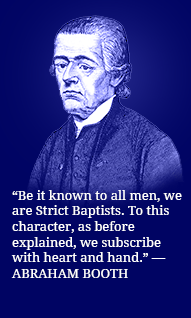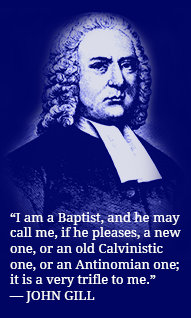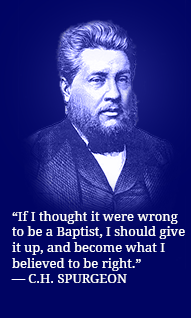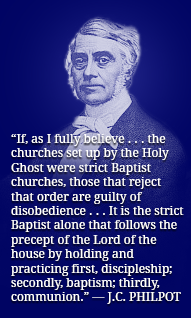On Baptist Identity
C. H. Spurgeon wrote, "If I thought it were wrong to be a Baptist, I should give it up, and become what I believed to be right." C. H. Spurgeon's Autobiography. (London: Passmore & Alabaster, 1897). Volume 1, Page 154. Again he said, "We are Baptists, and we cannot swerve from this matter of discipline." Autobiography. Volume 2, Page 328. On another occasion Spurgeon wrote, "We are Calvinistic Baptists, and have no desire to sail under false colors, neither are we ashamed of our principles; if we were, would renounce them tomorrow." The Metropolitan Tabernacle: Its History and Work. (London: Passmore & Alabaster, 1876). Page 4.
John Gill said, “I am a Baptist, and he may call me, if he pleases, a new one, or an old Calvinistic one, or an Antinomian one; it is a very trifle to me.” An Answer to the Birmingham Dialogue-Writer &c. - Part 1. (London: Aaron Ward, 1737). Page 134.
Abraham Booth wrote, “Our character is fixed. And be it known to all men, we are Strict Baptists. To this character, as before explained, we subscribe with heart and hand." A Defense of the Baptists &c. (London: E.& C. Dilly, 1778). Page 142.
Arthur W. Pink wrote, “This is the name which God gave to the first man who He called and commissioned to do any baptizing. He named him ‘John the Baptist.’ Hence, real Baptists have no reason to be ashamed of or to apologize for the Scriptural name they bear.” “The Churches of God” Studies in the Scriptures. (Dec., 1927). Page 5.
We do not believe the name “Baptist” possesses any special grace or imparts any soul-saving virtue to those who use it as a means of identification. We do not believe the name “Baptist” imparts any special ecclesiastical authority to those congregations who serve the Lord under that banner for one is not a “Baptist” because he bears that name but rather because he has been providentially and graciously led by God to genuinely believe and practice specific Bible principles. However, like those men quoted above, we feel constrained to say that the Baptists have no reason to be ashamed. As a people they have a specific history and spiritual heritage of proclaiming the universal Kingship of the Lord Jesus Christ and the absolute truth and unlimited authority of His Word. Therefore, contrary to many who have given up the Baptist name and cause, we believe the Baptists have a special heritage that’s worth knowing, preserving and proclaiming.
During the past hundred years there has been a growing effort among professional Baptist scholars to redefine the Baptist faith and Baptist history. Beginning from Enlightenment, anti-supernaturalistic presuppositions, reading the Bible and church history through the spectacles of “critical/scientific” methodology, influenced by the prestige of worldly religious establishments and their own ambition for authority and respectability, many modern Baptist scholars have hypothesized a complete dichotomy between the teaching of Scripture and the facts of history. As a result the public has, once again, been “assured” of the findings of scientific investigation, that is, we have been assured that modern Baptists have absolutely no connection with the Anabaptists of the Reformation era or the older, pre-Reformation evangelical movements. Operating from this perspective modern Baptist historians decided several decades ago that Baptists were really just another form of Protestant that arose during the Reformation era. While we should appreciate the genuine dedication of serious historians as well as their discovery and use of physical evidence in historical studies, we shouldn’t forget the ever-present “personal bias” of every historian, the “unavoidable limitations” of the scientific method and the ultimate authority of God’s Word. Above all else, Baptists dare not forget that the Word of God cannot be held hostage by human historiography! The most basic premise of every Bible believer is the existence and sovereignty of the Supernatural God and the ultimate authority of His Word over all things. This Biblical authority calls upon us to form a world-view, to get our ideas of origins, of the universe, of God, of man, of life and of time (past, present and future) from the revelation contained in God’s Word. Hence, our over-all understanding of world history (and thus of church history) must be ultimately controlled by the teaching contained in the Bible. All academic historical study must therefore be judged by Scripture and not vice versa. Unless we accept the secular, liberal view of the Bible, which divorces what the Bible records from all historical reality, then Baptists are called upon by their own view of ultimate Biblical authority to make a decision - either we must interpret history in the light of what the Bible teaches OR we must interpret the Bible in the light of a secular theory of history and its interpretation of available physical evidence. We believe that the truth of God’s existence, of the Gospel, of Christ’s resurrection, the Holy Spirit’s ministry, and the continual existence of Christ’s churches throughout history does not depend upon the discovery of historical, physical evidence or the opinions of religious scholars. These things are true regardless of the possession or non-possession of physical evidence and despite all scholarly opinion to the contrary. These things are true because they are clearly revealed in Scripture. Hence, our views of the nature of Baptist identity, Baptist history and the Baptist heritage must be shaped Biblically and Theologically. The foundations of both Christian Theology and Christian History are built upon the exegesis of Scripture. We do not define Baptist identity by what we see around us in the world today nor by what we see in the historical record of the past. Baptist identity is defined by what we see in the person, principles and practice of the first Baptist described in the Scriptures. The Scriptural example is that by which all others are judged. All that history can do is provide some evidence as to how faithful or how unfaithful modern Baptists have been to that original Biblical identity. In conclusion, if there has been any uncertainty, any indecisiveness, any doubts or confusion about Baptist identity it has not been on the part of some of our more conspicuous Baptist leaders of the past, as their quotations given at the first of this article make clear. Hence, in bearing witness to his own conception of the Baptist identity, history and heritage, C. H. Spurgeon could make the following three statements,
“We believe that the Baptists are the original Christians. We did not commence our existence at the Reformation, we were reformers before Luther or Calvin were born; we never came from the Church of Rome, for we were never in it, but we have an unbroken line up to the apostles themselves. We have always existed from the very days of Christ, and our principles, sometimes veiled and forgotten, like a river which may travel under ground for a little season, have always had honest and holy adherents. Persecuted alike by Romanists and Protestants of almost every sect, yet there has never existed a Government holding Baptist principles which persecuted others; nor, do I believe, any body of Baptists ever held it to be right to put the consciences of others under the control of man. We have ever been ready to suffer, as our martyrologies will prove, but we are not ready to accept any help from the State to prostitute the purity of the Bride of Christ to any alliance with Government, and we will never make the Church, although the Queen, the despot over the consciences of men." Metropolitan Tabernacle Pulpit. (London: Passmore & Alabaster,
1861). Volume 7, Page 225.
“Yield no principle, no, not the breadth of a hair of that principle. Stand up for every solitary grain of truth; contend for it as for your life. Remember your forefathers, not merely your Christian forefathers but those who are your progenitors in the faith as Baptists. Remember those who of old were cast out with contempt, because they would not bend to the errors of their times. Think of the snows of the Alps, and call to mind the Waldenses, and the Albigenses, your great forerunners. Think again, of the Lollards the disciples of Wycliffe; think of your brethren in Germany, who, not many centuries nay, but a century ago, were sewn up in sacks, had their hands chopped off, and bled and died -- a glorious list of martyrs. Your whole pedigree, from the beginning to the end is stained with blood. From the days of John the Baptist until now, the kingdom of heaven has been made to suffer the violence of men; and you! will you yield? Shall these soft times, these gentle ages, take away your pristine valor and make you the craven sons of heroic fathers? Never, I entreat of you, grow faint in your course, but bring more of the love of your hearts into the service of your lives. Never yield one tittle of the truth which God has committed to you.” New Park Street Pulpit. (London: Passmore & Alabaster, 1860). Volume 6, Pages
282-283.
“We tell these gentlemen who are so set upon fusing the Paedobaptists and the Baptists, that we hope all who think with them will avail themselves of the plank so conveniently and temptingly offered to them, but we take liberty to say again that there is one Baptist at least who will never be absorbed into the projected unity, and we believe that, with the exception of a score or so whom we could well spare, there are none among the Baptists who would consider for a moment the question of breaking up our ancient and useful Christian community.” The Sword and The Trowel. (London: Passmore & Alabaster, 1867). Volume 1, (March, 1867) Pages 327-328.
Through the centuries the Lord has been pleased to providentially record and preserve the special history, heritage and identity of the Baptists in the form of written materials, i.e., books, pamphlets, sermons, tracts, etc.. These materials have proven themselves to be a constant source of instruction, comfort and blessing to God's People. Many of these works are unknown today and can only rarely be found for sale on the secondhand book market. To help meet this need and to help preserve this identity The Baptist Standard Bearer, Inc., was founded upon a commitment toward republishing and preserving the special heritage of the Baptists. Since Biblical history shows that religiously and providentially the Lord has “left not Himself without witness” (Acts 14:17) and since the Bible teaches the abiding validity of the Gospel Commission (Matthew 28:18-20) and the perpetuity of the Gospel Churches (Matthew 16:18-19; Ephesians 3:20-21) and the symbolic utility of the Gospel Ordinances (Galatians 3:27; Romans 6:1-11; 1 Corinthians 11:26) and since the exalted Lord Jesus Christ, by His Spirit working in and with His ministers and churches, continues to “visit the nations to take out of them a people for His name” (Acts 15:14) and to “gather together the children of God that were scattered abroad” (John 11:52), since, I say, these things are sure, we believe there is an abiding necessity to preserve the heritage and identity of Baptists for the benefit of future generations. “Consider what I say; and the Lord give thee understanding in all things.” (2 Timothy 2:7).






